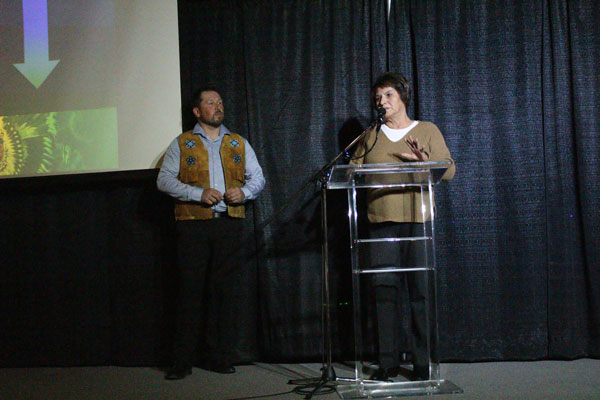
Services providers and community members had a chance to learn new skills addressing the harm caused by alcohol and other substances during workshops at Plaza 88 on Thursday and Friday.
The two day event was called “Evidence Based Approaches to Substance Use” and involved a partnership between SGI, Northern Alcohol Strategy and the Prince Albert Community Alcohol Strategy Steering Committee.
Karen Anthony-Burns coordinator of the Prince Albert and Area Community Alcohol Strategy Steering Committee (CASSC) said all residents could benefit from the training, and not just service providers.
“It’s just been terrific. We have had just tremendous engagement,” she said.
“It will help when they are working with people in our community and other communities around to make our community healthier and stronger.
“Obviously, there is a real interest in this and that’s really exciting.”
Although the workshops focused on helping local residents and service providers, Anthony-Burns said attendees arrived from across the province to take part. Topics covered include clinical approaches to substance use, trauma informed care and harm reduction, land-based healing, motivational interviewing, and collaborative approaches to community interventions.
TURN – Workshop turnout shows there is interest in learning new skills, CASSC spokesperson says
Continued from page 1
The workshop had 120 spots available over the two days, and instructors spoke to full capacity crowds each day.
“We hit our maximum for each day, so obviously there is a great interest in this,” Anthony-Burns said. “This is also being recorded, so the virtual platform will be available and that will be helpful for communities who are maybe a little more remote who want access.”
The recording can also be accessed by people who could not make the event because of scheduling conflicts.
Anthony-Burns herself did a presentation on the organization on Friday morning.
“I had about five minutes (to give) a brief overview of some of the work that CASSC has been doing in the community since we started up, sort of giving a little bit of our history, creating the strategy, some of the work we are doing, the cab coupons, SLGA, Liquor Bag project, the lowest drinking guidelines we are trying to push that,” Anthony-Burns said. “We are really trying to push that information right now.”
Another important aspect was having various service providers together at the conference, which allows them to collaborate on future plans.
“For me it’s important because I see that it’s going to help people within our community as well,” Anthony-Burns said. “When the service providers have these tools to work with the people we are going to make our whole community stronger.”
If they all speak the same language, then they see the same things and can collaborate from that level.
Some presenters also discussed the idea that alcohol use is on a spectrum. It can go from the addictions end of the spectrum to the other side of interventions and other approaches.
This includes ideas such as harm reduction and intervening in alcohol use before it becomes problematic.
“That’s the idea is trying to get the information, so we are doing it from the information perspective and also working with the city trying to address things. The city has been terrific in limiting liquor licenses here and limiting the proximity of establishments,” Anthony-Burns said,
The conference was about sharing information, but also about having people from different disciplines be part of the conversation around addiction.
The responsibility doesn’t just sit with one organization of agency but with communities. She explained that the power of the CASSC is that it is grassroots and community driven.
Speakers included Dr. Peter Butt, Dr. James Irvine, Erin Beckwell, Bev Drew, Joyce Night and Jarrett Nelson.
michael.oleksyn@paherald.sk.ca

